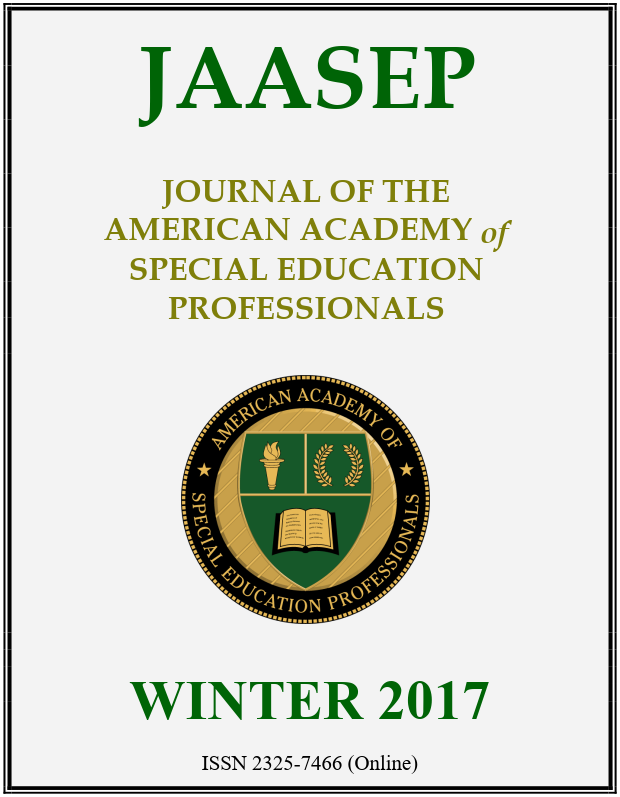A Comparative Study of Teachers’ Pedagogical Competencies in Supporting Children with Learning Difficulties in Primary Schools in Ghana and Brunei Darussalam
Abdul Aziz bin Begawan, Yang Berhormat Pehin Udana Khatib Dato Seri Paduka Haji Awing Umar, Pehin Kaya Laila Wijaya Dato Seri Setia Awing. (1996). Opening Address. In Conference Proceedings of the First National Conference on Special Education (pp. 1–5). Bandar Seri Begawan: Special Education Unit.
Abosi, C., O. (2007). Educating children with learning disabilities in Africa. Learning Disability Research & Practice, 22(3), 167-172. DOI: https://doi.org/10.1111/j.1540-5826.2007.00242.x
Miller, R., Acton, C., Fullerton, D., & Maltby, J. (2009). SPSS for social scientists (2nd ed.). USA: Palgrave Macmillan. DOI: https://doi.org/10.1007/978-1-137-01390-3
Agbenyega, J. & Deku, P. (2011). Building New Identities in Teacher Preparation for Inclusive Education in Ghana. Current Issues in Education, 14(1). Retrieved from http://cie.asu.edu/.
Anthony, J., H. (2009). Access to education for students with autism in Ghana: implications for EFA. Background paper prepared for the Education for All Global Monitoring Report 2010. Reaching the marginalized. 2010/ED/EFA/MRT/PI/10.
Bartolome, L. I. (1994). Beyond the methods fetish: Toward a humanizing pedagogy. Harvard Educational Review, 54(2), 173–194. DOI: https://doi.org/10.17763/haer.64.2.58q5m5744t325730
Casely-Hayford, L., Quansah, Patience Tetteh, P., Adams, R. & Adams, I. (2011). Inclusive Education in Ghana: a look at policy, and practice in Northern Ghana. For the Voluntary Service Organisation (VSO, Ghana): Associates for Change.
Cooper, D. R. & Schindler, P. S. (2003). Business research methods (8th edition), New York: McGrav-Hill Higher Education.
Cronbach, L. J. (1975). Beyond the two disciplines of scientific psychology. American Psychologist, 30 (4), 116-127. DOI: https://doi.org/10.1037/h0076829
Dyson, M. (2010). What might a person-centred model of teacher education look like in the 21st century? The transformism model of teacher education: Journal of Transformative Education, 8 (1), 3-21. doi:10.1177/1541344611406949. DOI: https://doi.org/10.1177/1541344611406949
Gadagbui, G. Y. (2008, November). Inclusive Education in Ghana: Practices, challenges and the future implications for all stakeholders Faculty of Educational Studies University of Education, Winneba. UNESCO 48th International conference. Inclusive education: the way of the future. Geneva, Switzerland.
Ghana Education Service [GES]. (2004). The development of education, national report of Ghana: the basic education division. Government Publications.
Government of Ghana. (2006).Persons With Disability Act, 2006Act 715.www.gapagh.org /GHANA%20DISABILITY%20ACT.pdf
Koay, T., L., Lim, L., Sim, W. K. & Elkins, J. (2006). Learning assistance and regular teachers’ perceptions of inclusive education in Brunei Darussalam. International Journal Of Special Education, 21(1), 131-142.
Kuyini, A. A. R. (2013). Teachers’ pedagogical competencies in including children with learning difficulties in Primary Schools in Ghana. Unpublished PhD thesis: University of Brunei Darussalam.
Kuyini, A. B., & Desai, I. (2008). Providing instruction to students with special needs in inclusive classrooms in Ghana: Issues and challenges. International Journal of Whole Schooling, 4(1), 22-39.
Kuyini, A. A. B., & Mangope, B. (2011). Student teachers’ attitudes and concerns about inclusive education in Ghana and Botswana. International journal of whole schooling, 7(1), 1-18.
Kuyini, A. A. R., & Abosi, O. (2011). The 2nd Generation Street Children (SGSC) in Accra: Developing teaching strategies to enhance positive learning outcomes in schools. World Journal of Education, 1(2), 161-171. DOI: https://doi.org/10.5430/wje.v1n2p161
Lieberman, A. & Mace, D. P. (2010). Making practice public: teacher learning in the 21st Century: Journal of teacher education, 61(1-2), 77-88. doi:10.1177/0022487109347319. DOI: https://doi.org/10.1177/0022487109347319
Ministry of Education. (2008). Special Education Unit. Retrieved May 4, 2011 from http://web-vidoo.moe.edubn/web/moe/seu.
Ministry of Education. (2009). National report on the provision of quality inclusive primary and secondary education for children with special needs and special educational needs(Disabilities). Jakarta: UNESCO International bearu of education. Retrieved August 17,2011 from www.ibe.unesco.org/fileadmin/user_upload_education/Report/ jakarta_09/ brunei_inclusion_09.pdf
Norulfazidah, H.B. (2011). Including Special Needs Students in Regular Classroom: Relief Teachers’ Perspectives. Brunei Darussalam: Sultan Hassanal Bolkial Institute of Education, University of Brunei Darussalam. Peters, S., J. (2004, November). Inclusive education: An EFA strategy for all children. World Bank. Retrieved from www.worldbank.org.
Peterson, M. (2005). Authentic, multi-level learning: creating high levels of learning for all students together. International journal of whole schooling. Retrieved from http://www.wholeschooling.net/WS/WSPrncples/WS%207%20Multilevel.html
Shulman, L. S. (1987). Knowledge and teaching: foundations of the new reform. Harvard educational review, 57(1), 1-21. DOI: https://doi.org/10.17763/haer.57.1.j463w79r56455411
Special education Unit (SEU). (1997). Special education policy guidelines. Bandar Seri Begawan: Ministry of Education.
UNESCO. (1994). Salamanca statement and framework for action on special needs education adopted by the world conference on special needs education: access and quality. UNESCO, Ed-94/WS/18.
Downloads
Article Information
- Article Type Articles
- Submitted December 28, 2016
- Published February 15, 2017
- Issue Winter 2017
- Section Articles
